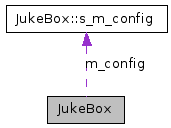
#include <jukebox.h>
Collaboration diagram for JukeBox:

Public Member Functions | |
| JukeBox () | |
| void | Init () |
| void | End () |
| bool | UseMusic () const |
| bool | UseEffects () const |
| int | GetFrequency () const |
| int | HowManyChannels () const |
| void | Pause () |
| void | Resume () |
| void | ActiveMusic (bool on) |
| void | ActiveEffects (bool on) |
| void | SetFrequency (int frequency) |
| void | SetNumbersOfChannel (int channels) |
| void | LoadXML (const std::string &profile) |
| int | Play (const std::string &category, const std::string &sample, const int loop=1) |
| int | Stop (int channel) |
| int | StopAll () |
Private Types | |
| typedef std::multimap< std::string, std::string >::value_type | sound_sample |
| typedef std::multimap< std::string, std::string >::iterator | sample_iterator |
Private Member Functions | |
| int | PlaySample (Mix_Chunk *sample, int loop=0) |
Static Private Member Functions | |
| static void | EndChunk (int channel) |
Private Attributes | |
| std::multimap< std::string, std::string > | m_soundsamples |
| std::map< int, Mix_Chunk * > | chunks |
| JukeBox::s_m_config | m_config |
| bool | m_init |
| std::set< std::string > | m_profiles_loaded |
Classes | |
| struct | s_m_config |
Definition at line 34 of file jukebox.h.
typedef std::multimap<std::string, std::string>::iterator JukeBox::sample_iterator [private] |
typedef std::multimap<std::string, std::string>::value_type JukeBox::sound_sample [private] |
| JukeBox::JukeBox | ( | ) |
| void JukeBox::ActiveEffects | ( | bool | on | ) | [inline] |
| void JukeBox::ActiveMusic | ( | bool | on | ) | [inline] |
| void JukeBox::End | ( | ) |
Definition at line 90 of file jukebox.cpp.
00091 { 00092 if (!m_init) return; 00093 m_init = false; 00094 00095 StopAll(); 00096 00097 m_soundsamples.clear(); 00098 m_profiles_loaded.clear(); 00099 00100 Mix_CloseAudio(); 00101 }
Here is the call graph for this function:

Here is the caller graph for this function:

| void JukeBox::EndChunk | ( | int | channel | ) | [static, private] |
| int JukeBox::GetFrequency | ( | ) | const [inline] |
| int JukeBox::HowManyChannels | ( | ) | const [inline] |
| void JukeBox::Init | ( | ) |
Definition at line 55 of file jukebox.cpp.
00056 { 00057 if (!m_config.music && !m_config.effects) { 00058 End(); 00059 return; 00060 } 00061 00062 if (m_init) return; 00063 00064 Uint16 audio_format = MIX_DEFAULT_FORMAT; 00065 00066 /* Initialize the SDL library */ 00067 if ( SDL_Init(SDL_INIT_AUDIO) < 0 ) { 00068 std::cerr << "* Couldn't initialize SDL: "<< SDL_GetError() << std::endl; 00069 return; 00070 } 00071 00072 int audio_buffer = 1024; 00073 00074 /* Open the audio device */ 00075 if (Mix_OpenAudio(m_config.frequency, audio_format, m_config.channels, audio_buffer) < 0) { 00076 std::cerr << "* Couldn't open audio: " << SDL_GetError() << std::endl; 00077 return; 00078 } else { 00079 Mix_QuerySpec(&m_config.frequency, &audio_format, &m_config.channels); 00080 std::cout << "o Opened audio at " << m_config.frequency <<" Hz "<< (audio_format&0xFF) 00081 <<" bit " << std::endl; 00082 } 00083 Mix_ChannelFinished(JukeBox::EndChunk); 00084 00085 m_init = true; 00086 00087 LoadXML("share"); 00088 }
Here is the call graph for this function:
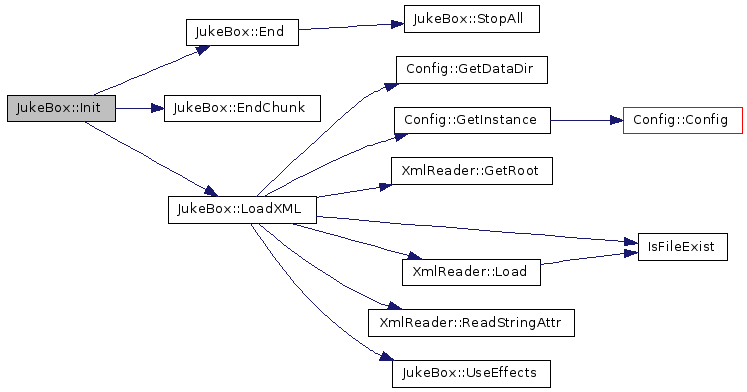
Here is the caller graph for this function:

| void JukeBox::LoadXML | ( | const std::string & | profile | ) |
Definition at line 132 of file jukebox.cpp.
00133 { 00134 00135 if (!UseEffects()) return; 00136 00137 // is xml_file already loaded ? 00138 std::set<std::string>::iterator it_profile = m_profiles_loaded.find(profile) ; 00139 if (it_profile != m_profiles_loaded.end()) { 00140 MSG_DEBUG("jukebox", "Profile %s is already loaded !", profile.c_str()); 00141 return; 00142 } 00143 std::cout << "o Loading sound profile " << profile << std::endl; 00144 00145 XmlReader doc; 00146 00147 // Load the XML 00148 std::string folder = Config::GetInstance()->GetDataDir() + PATH_SEPARATOR + "sound"+ PATH_SEPARATOR + profile + PATH_SEPARATOR; 00149 std::string xml_filename = folder + "profile.xml"; 00150 if( !IsFileExist(xml_filename) ){ 00151 std::cerr << "[Sound] Error : file " << xml_filename << " not found" << std::endl; 00152 return; 00153 } 00154 if(!doc.Load(xml_filename)) 00155 return; 00156 00157 xmlpp::Node::NodeList nodes = doc.GetRoot()->get_children("sound"); 00158 xmlpp::Node::NodeList::iterator 00159 it=nodes.begin(), 00160 fin=nodes.end(); 00161 00162 for (; it != fin; ++it) 00163 { 00164 // lit le XML 00165 xmlpp::Element *elem = dynamic_cast<xmlpp::Element*> (*it); 00166 std::string sample="no_sample"; 00167 std::string file="no_file"; 00168 XmlReader::ReadStringAttr(elem, "sample", sample); 00169 XmlReader::ReadStringAttr(elem, "file", file); 00170 00171 MSG_DEBUG("jukebox", "Load sound sample %s/%s: %s", profile.c_str(), sample.c_str(), file.c_str()); 00172 00173 // Charge le son 00174 std::string sample_filename = folder + file; 00175 if( !IsFileExist(sample_filename) ){ 00176 std::cerr << "Sound error: File " << sample_filename.c_str() 00177 << " does not exist !" << std::endl; 00178 continue; 00179 } 00180 00181 // Inserting sound sample in list 00182 m_soundsamples.insert(sound_sample(profile+"/"+sample, sample_filename)); 00183 } 00184 00185 // The profile is loaded 00186 m_profiles_loaded.insert(profile); 00187 }
Here is the call graph for this function:
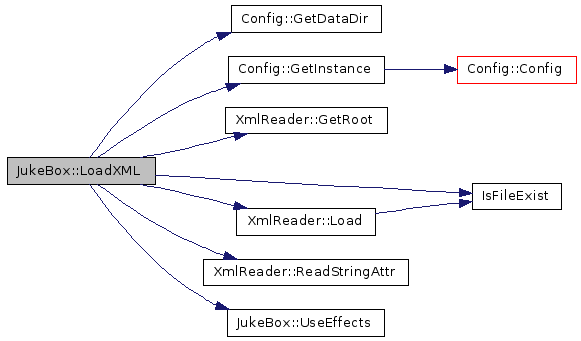
Here is the caller graph for this function:

| void JukeBox::Pause | ( | ) |
| int JukeBox::Play | ( | const std::string & | category, | |
| const std::string & | sample, | |||
| const int | loop = 1 | |||
| ) |
Playing a sound effect
Definition at line 189 of file jukebox.cpp.
00191 { 00192 if (!UseEffects()) return -1; 00193 00194 uint nb_sons= m_soundsamples.count(category+"/"+sample); 00195 if (nb_sons) 00196 { 00197 std::pair<sample_iterator, sample_iterator> p = m_soundsamples.equal_range(category+"/"+sample); 00198 sample_iterator it = p.first; 00199 00200 // Choose a random sound sample 00201 if (nb_sons > 1) 00202 { 00203 uint selection = uint(randomObj.GetLong(0, nb_sons)); 00204 if (selection == nb_sons) --selection ; 00205 00206 it = p.first ; 00207 00208 for ( uint i=0 ; i<selection && it!=p.second ; ++i ) it++ ; 00209 } 00210 00211 // Play the sound 00212 Mix_Chunk * sampleChunk = Mix_LoadWAV(it->second.c_str()); 00213 MSG_DEBUG("jukebox.play", "Playing sample %s/%s", category.c_str(), sample.c_str()); 00214 return PlaySample(sampleChunk, loop); 00215 } 00216 else if (category != "default") { // try with default profile 00217 return Play("default", sample, loop) ; // try with default profile 00218 } 00219 00220 MSG_DEBUG("jukebox", "Error: No sound found for sample %s/%s", category.c_str(), sample.c_str()); 00221 return -1; 00222 }
Here is the call graph for this function:

Here is the caller graph for this function:
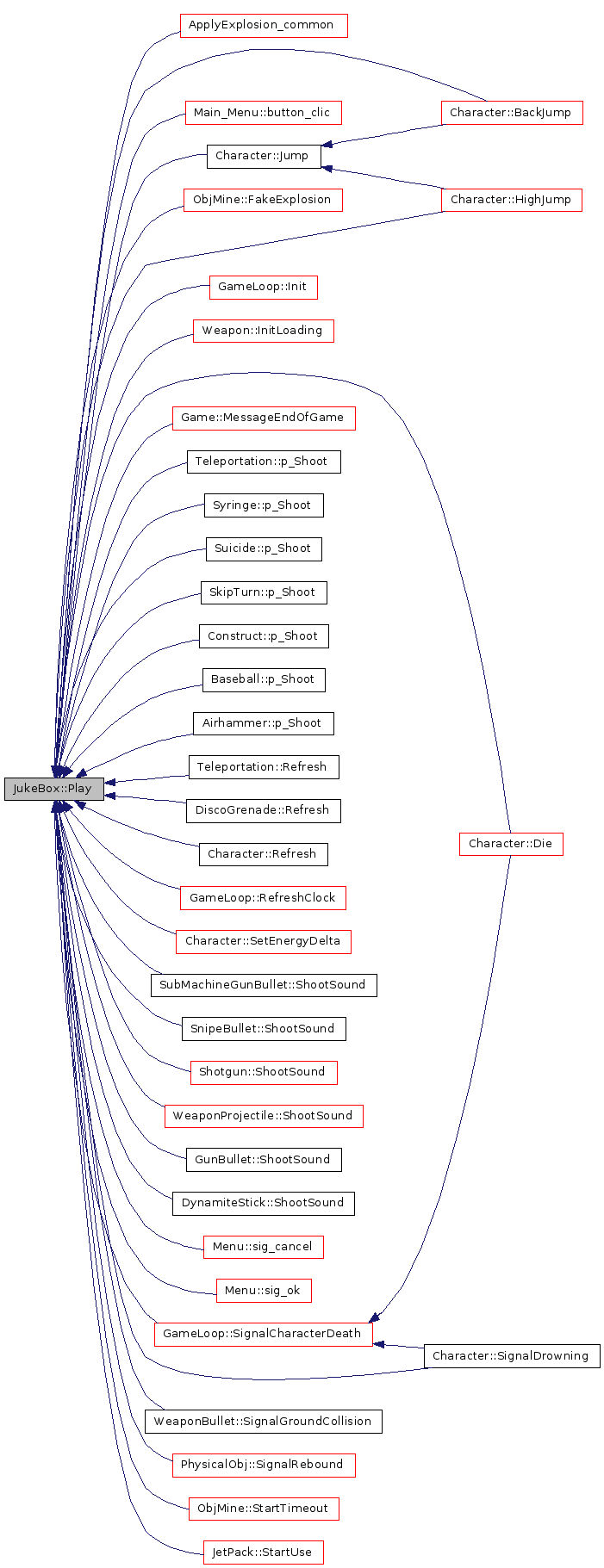
| int JukeBox::PlaySample | ( | Mix_Chunk * | sample, | |
| int | loop = 0 | |||
| ) | [private] |
Playing a sound effect
Definition at line 239 of file jukebox.cpp.
00240 { 00241 if (loop != -1) loop--; 00242 00243 int channel = Mix_PlayChannel(-1, sample, loop); 00244 00245 if (channel == -1) { 00246 MSG_DEBUG("jukebox", "Error: Jukebox::PlaySample: %s", Mix_GetError()); 00247 Mix_FreeChunk(sample); 00248 } 00249 else 00250 chunks[channel] = sample; 00251 return channel; 00252 }
Here is the caller graph for this function:

| void JukeBox::Resume | ( | ) |
| void JukeBox::SetFrequency | ( | int | frequency | ) |
Definition at line 103 of file jukebox.cpp.
00104 { 00105 if ((frequency != 11025) 00106 && (frequency != 22050) 00107 && (frequency != 44100)) frequency = 44100; 00108 00109 if (m_config.frequency == frequency) return; 00110 00111 m_config.frequency = frequency; 00112 00113 // Close and reopen audio device 00114 End(); 00115 Init(); 00116 }
Here is the call graph for this function:
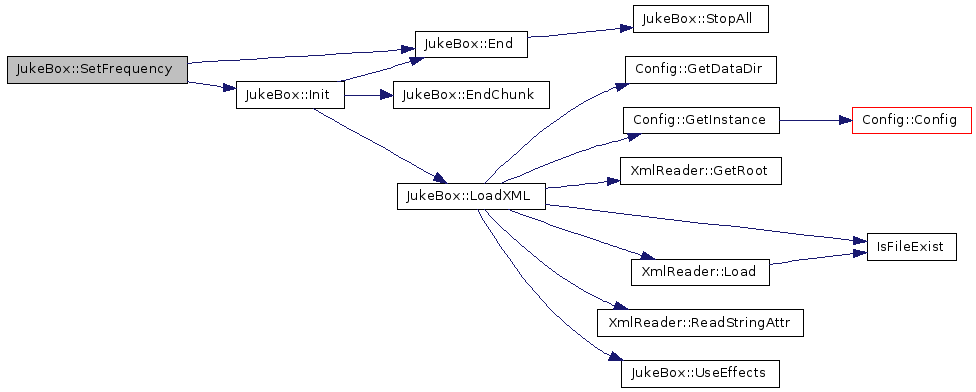
Here is the caller graph for this function:

| void JukeBox::SetNumbersOfChannel | ( | int | channels | ) |
| int JukeBox::Stop | ( | int | channel | ) |
| int JukeBox::StopAll | ( | ) |
| bool JukeBox::UseEffects | ( | ) | const [inline] |
| bool JukeBox::UseMusic | ( | ) | const [inline] |
std::map<int, Mix_Chunk*> JukeBox::chunks [private] |
struct JukeBox::s_m_config JukeBox::m_config [private] |
bool JukeBox::m_init [private] |
std::set<std::string> JukeBox::m_profiles_loaded [private] |
std::multimap<std::string, std::string> JukeBox::m_soundsamples [private] |
 1.4.7
1.4.7